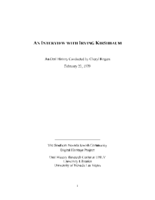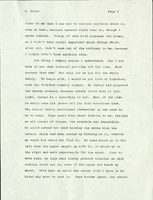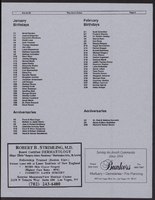Search the Special Collections and Archives Portal
Search Results

Transcript of interview with Irving Kirshbaum by Cheryl Rogers, February 23, 1979
Date
Archival Collection
Description
Interview with Irving Kirshbaum by Cheryl Rogers on February 23, 1979. In this interview, Kirshbaum discusses the Riviera Hotel where he began working in 1955. He also talks about the landscape of the Las Vegas Strip in the 1950s, and the state of gambling, comps, customer service, and dealer training. The interviewer asks about the treatment of minorities at the Riviera, and in Las Vegas generally, and the effect of corporate ownership on casinos.
Text

Preprint, Where I Stand: The Record of a Reckless Man, by Hank Greenspun with Alex Pelle, 1966
Date
Archival Collection
Description
Book proof with annotations from editors in the margins.
Text

Chapter from autobiography by Bella Stern, 1980
Date
Archival Collection
Description
In this chapter, Stern describes her upbringing in Russia and fleeing to Poland. It is accompanied by a letter to the publishing company William Morrow.
Text

Jill Roberts oral history interview: transcript
Date
Archival Collection
Description
Oral history interview with Jill Roberts conducted by Barbara Tabach and Claytee D. White on March 20, 2018 for the Remembering 1 October Oral History Project. In this interview, Jill Roberts discusses her position as the CEO of the Trauma Intervention Program (TIP) of Southern Nevada. She also delves into her part-time work at the coroner's office as a death investigator and discusses her personal background in Las Vegas, Nevada after she moved to the city in 1977. She describes the role TIP had during the aftermath of the October 1, 2017 mass shooting, where well-trained volunteers were dispatched to hotels, hospitals, and anywhere else the survivors reached in order to provide emotional and practical support. Throughout the interview, Roberts emphasizes that the assistance provided to those in a traumatic event depends on each individual's needs. She shares a few examples of what the TIP volunteers had helped with after the shooting, including listening to the survivors' stories as well as providing information on the situation, helping separated loved ones find each other, arranging travel for some survivors to go back to their homes, and procuring clothes and shoes for those who needed them. Roberts also discusses the gratitude TIP had received after the shooting, including the thank you cards sent by Sandy Hook High School.
Text

Paul Velez oral history interview: transcript
Date
Archival Collection
Description
Oral history interview with Paul Velez conducted by Barbara Tabach on February 22, 2018 for the Remembering 1 October Oral History Project. In this interview, Paul Velez, a University of Nevada, Las Vegas (UNLV) campus officer, discusses his experience at the Thomas & Mack Center during the night of the October 1, 2017 mass shooting in Las Vegas, Nevada. He shares his goal of creating a safe atmosphere for the survivors and providing them with all of their needs, including helping separated survivors find their loved ones and friends. Velez also describes his move to Las Vegas in 2008 and his time with the New York City police force, talking about his experience as a first responder at Ground Zero during the 9/11 attacks. He discusses the effect these attacks have had on general and campus security measures and on him as an individual.
Text

Rodel Fuentes oral history interview: transcript
Date
Archival Collection
Description
Oral history interview with Rodel Fuentes conducted by Tracy Fuentes on December 4, 2021 for Reflections: The Las Vegas Asian American and Pacific Islander Oral History Project. Rodel Fuentes tells stories of his upbringing in Manila, Philippines, where he was raised in a shared family home amongst his parents, siblings, aunts, and uncles. He talks about his parents' immigration to the United States and how he later joined them in Los Angeles, California where he met and married his wife. Rodel Fuentes shares the couple's decision to move to Las Vegas, Nevada, his work at Dunn Edwards paint company, and how he became a licensed general contractor and real estate agent where he now owns his own company. Rodel Fuentes discusses his thoughts on Las Vegas' diversity, affordability, restaurants, and Asian community. He also talks about experiencing anti-Asian hate, worsened by misconceptions and discrimination that came from the COVID-19 pandemic.
Text

Transcript of interview with Margaret Price by Joanne Goodwin, March 5, 1997
Date
Archival Collection
Description
When farm-girl-turned-waitress, Margaret "Maggie" Price, came to Las Vegas from Ohio in 1950 with her husband, Francis "Frank" Price, she had no idea what was in store for her in the hot desert oasis. Maggie's career spanned a period of historical transformation in Las Vegas when Downtown was becoming overshadowed by the development on the Las Vegas Strip. Vaudeville and striptease acts were still alive, but the arrival of big-named acts, such as the Rat Pack, Barbara Streisand, and the King himself, Elvis Presley, were just beginning to take the lead. Organized crime was still a prominent part of the culture and brothels still operated somewhat openly. The three decades Maggie and Frank worked in Las Vegas provided them with front-row seats for the birth, transformation, and occasional death of numerous casinos, including the Sahara, the Flamingo, the Sands, the Dunes, the Tropicana, and the International. Initially going to work as a waitress at the El Rancho Vegas, Maggie
Text

Transcript of interview with Mary Shaw by Barbara Tabach, September 2, 2011
Date
Archival Collection
Description
For the first 19 years of her life, Mary Martell Shaw called Central America home. Then thanks to misrouted luggage, she met the love of her life Rollin H. Shaw, a civil engineer, at a time in when his atomic energy career was taking off. In October 1943, they married in Costa Rica and for the next two decades traversed the country: Hawaii to California to Panama—wherever a project required Ronnie's engineering skills. Mary supported her husband every step of the way, with every new location. As a traditional homemaker of the era, she became adept at raising their four kids while packing boxes, enrolling them in school and setting up a warm home wherever they landed. The move to Las Vegas in September 1964, however, left her a bit challenged: there was a shortage of adequate housing, a concern for where to send her two daughters and two sons to school, and the feeling that they wouldn't be here long. Years later, Mary and Ronnie would retire to the city where their roots ran deepest, Las Vegas. With great wit, Mary recalls the long absences demanded by Ronnie's work with the Atomic Energy Commission. She also tells stories of the great fun they and their fellow Nevada Test Site employees had at parties, of her learning to paint with watercolors, and the pride she has of all her children's successes based on their education in Las Vegas.
Text


